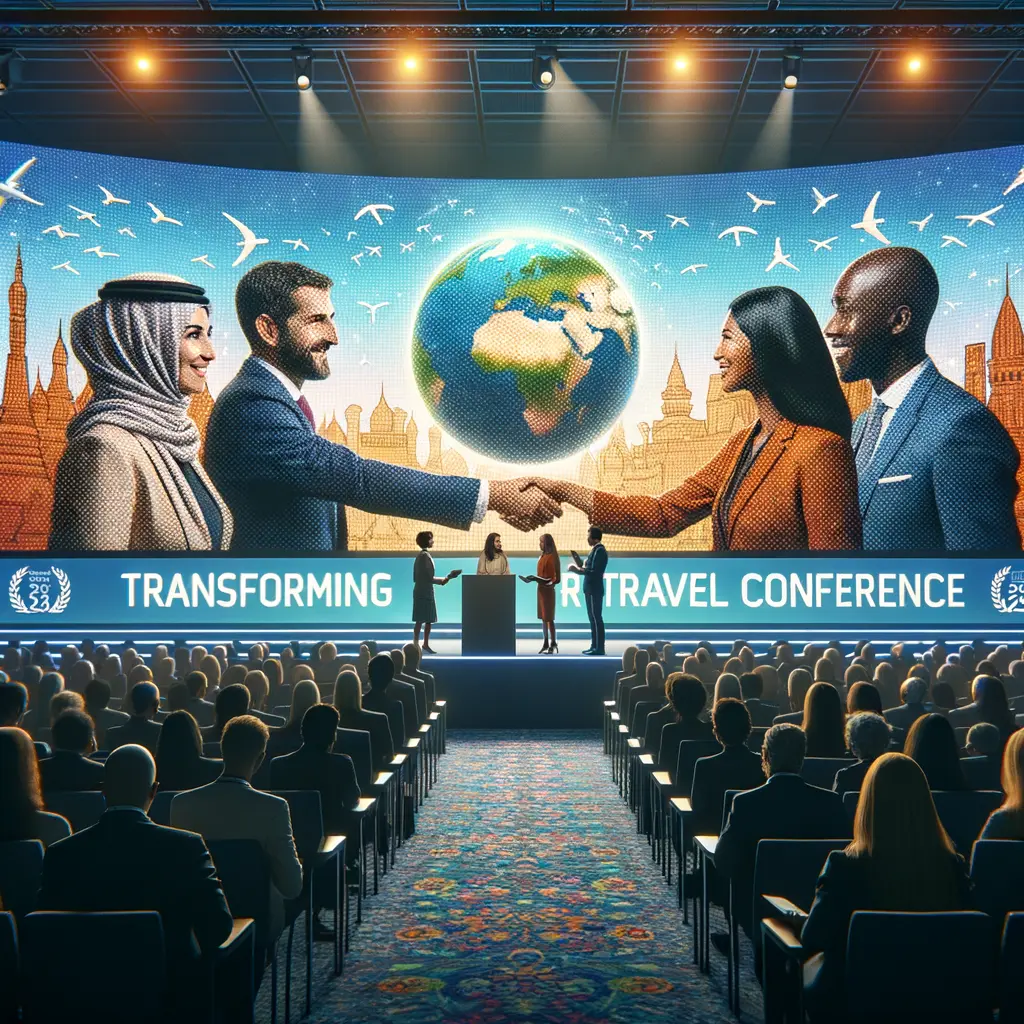ITB Berlin 2025: Why the World’s Biggest Travel Show Matters
ITB Berlin 2025 is poised to be the most data-driven, sustainability-focused edition of the show to date. From 10–13 March, more than 10,000 exhibitors and 160,000 trade visitors will converge on the Messe Berlin fairgrounds to map out the next chapter of global travel. For decision-makers, ITB is far more than a networking event; it is the barometer for global travel trends 2025, the place where destination marketing organisations, airlines, tour operators and tech innovators negotiate deals that will shape the itineraries of millions of travellers. In 2024, the show generated €7 billion in signed contracts; organisers expect this figure to rise as pent-up demand meets new product development in 2025.
The primary theme—Transforming Travel—centres on sustainable tourism and equitable growth, issues underscored throughout the official conference agenda and the video interviews from destinations including Indonesia, the Philippines and Saudi Arabia. Whether you are a destination manager, a hotelier or a travel-tech start-up, ITB Berlin 2025 offers actionable tourism industry insights, from carbon-accounting tools to circular-economy supply chains. Related reading: check our guide to EU Tourism Recovery Funds for SMEs.
With six themed halls dedicated to responsible tourism, adventure travel, MICE, medical, luxury and digital services, attendees can benchmark best practices and meet future collaborators under one roof. Simply put, missing ITB Berlin 2025 means missing the pulse of the industry.

Sustainable Tourism Takes Center Stage in 2025
If one narrative dominates ITB Berlin 2025, it is the transition from volume to value. The show’s Responsible Tourism Café will showcase case studies that echo the voices in the video: empowering indigenous communities in the Philippines, supporting 6,000 Indonesian villages, and conserving Kazakhstan’s national parks. These stories highlight how sustainable tourism goes beyond carbon offsets. It creates jobs in rural areas, preserves cultural heritage, and channels visitor spending into local supply chains.
Expect to see concrete frameworks such as the Global Sustainable Tourism Council (GSTC) criteria embedded in new certification programmes. Destination marketers are also turning to regenerative principles—leaving places better than they were found—through habitat restoration projects and plastic-free tour operations. On the technology side, carbon-footprint dashboards will be integrated into booking engines so travellers can filter low-emission itineraries at the point of sale.
For travel brands, aligning with these standards is no longer optional. Research by Booking.com shows 76 % of global travellers want to make more sustainable choices, yet 43 % find it difficult to identify credible options. ITB exhibitors that can translate sustainability into clear benefits—reduced energy bills for hotels, higher yields for local farmers, richer guest experiences—will capture both market share and traveller loyalty. Related reading: see our deep dive into Sustainable Travel Marketing Tactics.

Emerging Destinations to Watch: From Wales to Saudi Arabia
Beyond perennial hot spots, ITB Berlin 2025 shines a spotlight on emerging travel destinations eager to diversify their visitor economies. Film tourism continues to drive traffic: Manchester’s street scenes doubled as New York in Captain America, North Wales beaches starred in House of the Dragon, and Scotland’s Highlands still lure fans of James Bond. Tourism boards are turning these cinematic landscapes into self-drive trails with downloadable GPS routes and AR storytelling apps.
In Asia, the Philippines’ “One Island at a Time” strategy invites travellers to explore lesser-known archipelagos such as Siargao and Romblon, relieving pressure on Boracay. Indonesia’s Ministry of Tourism is opening 6,000 certified village homestays across Java and Flores, each offering rice-field trekking, batik workshops and zero-plastic policies. Japan, meanwhile, packages regional matsuri festivals—think Aomori’s Nebuta or Kochi’s Yosakoi—as immersive cultural journeys that extend average length of stay by two nights.
The Middle East is rapidly diversifying. Saudi Arabia positions its Red Sea beaches and Arabian dune camps as a winter alternative to African safaris, while Oman sees growth in wadis and mountain trekking. In Central Asia, Kazakhstan leverages visa-free entry for 80 nations and improved rail corridors from China to attract both adventure seekers and business tourists. Embedded video: watch the full ITB Berlin 2025 destination roundup above for on-site interviews.
The Rise of Experiential & Slow Travel
Experiential travel—often called transformational or slow travel—moves the industry from checklist tourism to deep engagement. Speakers at ITB Berlin 2025 cited slow food initiatives in Georgia, community farming in Italy, and Thai culinary homestays as examples where travellers become co-producers instead of passive consumers. Gastronomy sits at the heart of this shift. According to the World Food Travel Association, culinary experiences influence 81 % of travellers’ choice of destination.
Destinations featured in the video are seizing the moment. Azerbaijan curates vineyard-to-table tours an easy two-hour drive from Baku; Georgia’s Kakheti region pairs qvevri wine making with bread-baking masterclasses. In Thailand, the Tourism Authority’s “First Impressions” programme bundles street-food walks with hotel safety certifications to reassure first-time visitors. All these products align with the global travel trends 2025 in which authenticity, wellness and low-impact mobility converge.
Operators are re-engineering itineraries to reduce miles travelled per day and increase dwell time per stop. Benefits ripple outward: lower emissions, higher visitor spending per community, and more meaningful storytelling. If you’re designing packages, consider adding volunteer beach clean-ups or craft workshops hosted by local artisans. Related reading: explore our Slow Travel Itinerary Toolkit for tour designers.

Travel Tech & Innovation Spotlight at ITB Berlin 2025
Digital transformation is the backbone of every discussion at ITB Berlin 2025. Expect entire halls dedicated to AI-powered trip planning, biometrics-enabled airport journeys and blockchain-backed loyalty programmes. Booking platforms such as Amadeus and Sabre will demo predictive demand engines that apply machine learning to historical flight data, helping airlines optimise capacity and cut fuel burn. Meanwhile, start-ups in the eTravel Lab showcase voice-search travel assistants that turn natural-language requests—“Find me a carbon-neutral island escape in July”—into bookable itineraries.
Sustainability tech also scales up. Carbon calculators like CHOOOSE integrate with GDS systems so agents can display CO₂ emissions alongside price. Hotel chains roll out Internet-of-Things occupancy sensors to automatically adjust HVAC systems, cutting energy use by up to 30 %. For destinations, geospatial dashboards aggregate anonymised mobile data to monitor visitor flows in real time, preventing overcrowding at fragile heritage sites.
The financing landscape is buoyant: Saudi Arabia’s inbound investment hub invites SMEs to pilot desert-camp glamping pods, while the EU’s Horizon Europe fund offers €100 million for green mobility innovations. Investors will be scouting for solutions that sit at the intersection of ITB Berlin 2025 themes—sustainable tourism, emerging travel destinations and seamless digital journeys. Related reading: get our Tourism Tech Funding Guide 2024–2027.

Key Takeaways from ITB Berlin 2025 for Travel Professionals
ITB Berlin 2025 makes one point crystal clear: the future of travel hinges on balancing growth with responsibility. The primary keyword, ITB Berlin 2025, threads through every initiative—from carbon-smart booking engines to community-owned homestays. For destinations, differentiation means spotlighting authentic culture and leveraging film locations or festivals to stand out among emerging travel destinations. For tour operators, designing slower, experience-rich itineraries answers travellers’ calls for meaning while hitting sustainability KPIs.
Technology is the great enabler. AI reduces friction, while data analytics guides crowd management and marketing spend. But tech alone is not a panacea. Success lies in collaboration: DMOs partnering with local farmers, hotels co-creating renewable-energy microgrids, and investors funding beta pilots that can be scaled globally.
Next steps: audit your product portfolio against GSTC criteria, embed carbon metrics in all client-facing materials, and cultivate partnerships with the innovators you meet at the show. Doing so not only meets the rising demand sparked by global travel trends 2025 but future-proofs your brand against regulatory and consumer shifts.
In closing, ITB Berlin 2025 offers unparalleled tourism industry insights. Use them to craft regenerative experiences, adopt smart tech, and tell compelling stories that inspire travellers for years to come.







